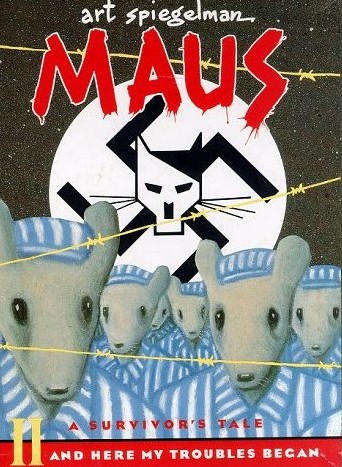I learned to read on old copies of Mad and still have a special place in my heart for Harvey Kurtzman and Will Elder’s Melvin Mole (which introduced my to Existentialism long before I knew the term existed) and Elder’s haunting adaptation of Poe’s The Raven. These magazines were the gateway drug for the first two novels I read, Animal Farm and Wuthering Heights. William Gaines and the “usual gang of idiots” had prepared me well.
I never cared much for superhero comic books at a kid, but at the late, great Coliseum Books on Manhattan’s West Side, I came across copies of Raw and Art Spiegelman’s Maus, which wrecked my brain (in the best sense) the way Mad had. In my early adulthood, I would alternate reading these titles with books by Nathanael West, Dostoyevsky and Kafka. It was tremendous.
Raw editor Françoise Mouly, who has gone on to do stupendous work turning out New Yorker covers, is trying to enable future generations of readers with her own panel-centric imprint, Toon Books. Jeff MacGregor of Smithsonian interviewed her recently. An excerpt about literacy in the Digital Age:
Question:
Do you think it’s more useful to have these in school or to have them in the home?
Françoise Mouly:
You cannot, in this day and age, get them in the home. Everybody [used to] read newspapers, everybody read magazines, everybody read books. There were books in the home. Not media for the elite, [but] mass media. Books and magazines were as prevalent then as Facebook is, as Twitter is. That’s not the case anymore. Most kids at the age of 5 or 6 don’t see their parents picking up a newspaper or a magazine or a pulp novel or literary novel. So you know, [it becomes] “You must learn to read.” It’s completely abstract.
The libraries are playing an essential role. The librarians and the teachers were the ones removing comics from the hands of kids back in the ’60s and ’70s. Now it’s actually almost the other way around. Most kids discover books and comics, if they haven’t had them for the first five years of their lives, when they enter school. Because when they enter school, they are taken to the library. And librarians, once they open the floodgates, they realize, “Oh my God, the kids are actually asking to go to the library because they can sit on the floor and read comics.” You don’t have to force them — it’s their favorite time. So then what we try to do, when we do programs with schools, is try to do it in such a way that a kid can bring a book home because you want them to teach their parents.
Question:
Is there an electronic future for these?
Françoise Mouly:
One of my colleagues was saying e-books replaced cheap paperbacks and maybe that’s good. A lot of this disposable print can be replaced by stuff you didn’t want to keep. But when I read a book, I still want to have a copy of the book. I want it to actually not be pristine anymore, I want to see the stains from the coffee – not that I’m trying to damage my book, but I want it to have lived with me for that period of time. And similarly, I think that the kids need to have the book. It’s something they will hold in their hand, and they will feel the care we put into it. The moment I was so happy was when a little girl was holding one of the Toon Books, and she was petting it and closing her eyes and going, “I love this book, I love this book.” The sensuality of her appreciation for the book, I mean, that’s love.•


